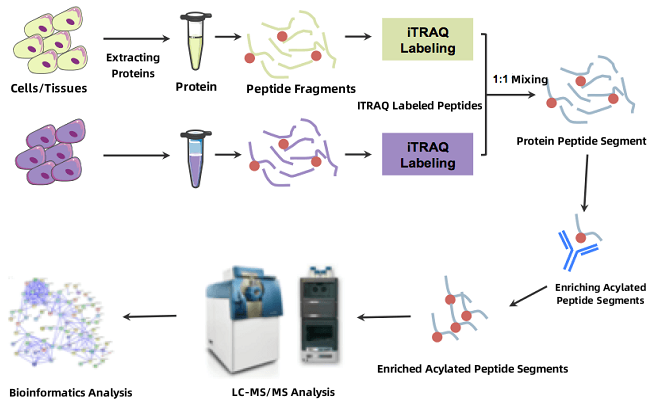Quantitative Acetylomics Service
- Regulation of Cellular Energy Metabolism
- Research on Mechanisms and Treatment of Metabolic Syndrome
- Investigation of Fungal and Bacterial Interactions and Pathogenicity
Acylation is a post-translational modification involving the attachment of acyl groups, such as acyl-CoA, to proteins. This modification plays a pivotal role in regulating key biological processes including epigenetics, energy metabolism, protein trafficking, and molecular interactions. Acylation research is a dynamic field in life sciences, with studies expanding beyond acetylation to include propionylation, malonylation, glutarylation, succinylation, and crotonylation. Quantitative proteomics of acylation provides insights into the vital link between protein acylation changes and biological functions, offering valuable information for uncovering life mechanisms, identifying clinical disease markers, and targeting drug discovery.
The acylation quantitative proteomics process begins by enzymatically digesting protein samples into peptides. These peptides are then separated using liquid chromatography to simplify the mixture. Specific acylation modifications are enriched using targeted antibodies or kits, followed by quantification with LC-MS/MS.
MtoZ Biolabs employs the Thermo Fisher’s Orbitrap Fusion Lumos mass spectrometry system alongside nanoLC platform for comprehensive Quantitative Acylomics Service. We invite researchers to share their experimental goals and submit their samples, after which our team manages all aspects of the analysis. This includes protein extraction, digestion, peptide enrichment, chromatographic separation, mass spectrometric analysis, and subsequent bioinformatics evaluations.

Figure 1. Acylation Quantitative Proteomics Analysis
Services at MtoZ Biolabs
Acetylation
Succinylation
Propionylation
Malonylation
Glutarylation
Sample Submission Requirements
1. Sample Type
(1) Tissue Samples
The recommended sample requirements are 10 g for plant tissues, 200 mg for animal tissues, 100 µL for serum/plasma (with plasma anticoagulated using EDTA), 2 mL for urine, and 1x108 cells for cell samples. For yeast and other microorganisms, a dry weight of 500 mg is recommended.
(2) Protein Samples
Ensure a minimum of 2 mg total protein. Use standard lysis solutions for tissue and cell extraction.
2. Sample Shipping
Transport samples with adequate dry ice and opt for expedited shipping to minimize degradation risks during transit.
3. Sample Testing
We evaluate all samples before commencing the actual experiments. Testing must confirm sample integrity before proceeding with formal analyses.
Applications
Deliverables
In the technical report, MtoZ Biolabs will provide you with detailed information, including:
1. Experimental Procedures
2. Relevant Spectrometric Parameters
3. Comprehensive Details on Identified Acylation Sites
4. Mass Spectrometry Images
5. Raw Data
MtoZ Biolabs, an integrated chromatography and mass spectrometry (MS) services provider.
Related Services
Acylation Quantitative Proteomics Services
How to order?







